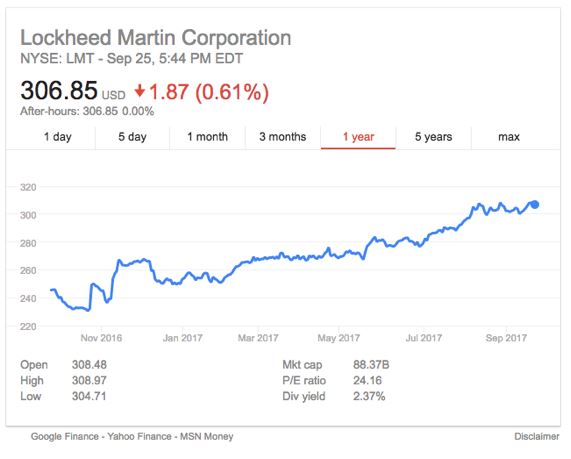
Shortly before Christmas Eve last year, the shareholders of Lockheed Martin were oblivious to an avalanche that was about to hit them, decreasing their stock price to the tune of USD$4 billion- all in the form of 140 characters.
When President-elect Donald Trump tweeted on 12 December 2016, 2% of the company’s market capitalisation was shaved off within hours.

Though this wasn’t the first time the President-elect named and shamed companies, the concept of political risk just got a whole new meaning.
But not for long. As the weeks passed by, this turned out to be a blip rather than a freefall, and the stock has shown a steady upward trend in months since.

So how should companies prepare to address political risk? A roundtable, organised by the Public Affairs Council (PAC) and Ellwood Atfield in London on 12 Sept 2017, set out to tackle this question. On the panel were:
- Doug Pinkham, President of the Public Affairs Council
- Chloe MacEwen, Vice President Public and Regulatory Affairs at Western Union
- John Dickie, Director of Strategy and Policy at London First
- Ben Atfield, Managing Director at Ellwood Atfield
Risk, while being a potential source of new business opportunities, is not limited to a politician saying (or tweeting) something affecting a company or sector. Business crises may be caused by major social or political shifts, such as when an increasing number on the political left and right develop anti-corporate sentiments.
Political risk also appears when consumers or citizens distrust an industry. When this happens they tend to exert increasing pressure to regulate that sector more stringently. Our first speaker, PAC President Doug Pinkham, put it this way, “The act of regulating is an act of distrust”. Citing the Pulse Survey, Doug stated that there is a clear correlation between trust and the desire to rein in a sector by regulating it further.
Chloe MacEwen from Western Union made the point that how a company reacts to strategic threats greatly depends on its “risk appetite”. It is therefore important to be clear on the extent to which an organisation is willing to experiment or be daring in its public affairs strategy.
One thing is for sure: there is an enormous difference between blind risk-taking and a well thought-out, calculated step in full knowledge of the odds.
When a regulator, such as the European Commission or the British Government decides to rewrite the rules, it can be more effective to understand the stated objectives, suggest constructive changes and point out the unintended consequences rather than necessarily oppose the new rules from the outset.

This is somewhat akin to the winter sport of Curling: whilst the stone’s progress may seem to be inexorable, your judicious and energetic sweeping (i.e. public affairs strategy) can still alter its path and destination.
The difficult question is how to do it.
If you operate in a B2C market, you may be able to get your customers to speak up for you. Uber and tech companies tend to apply this technique when the stakes are high and customers are willing to be politically engaged — with varying degree of success.

Others do scenario planning: a sophisticated exercise measuring the odds and impact of a political event, regulatory change or change in public sentiment, and evaluating the resulting government affairs strategy they should put in place. For instance, what does a “hard Brexit”, a “soft Brexit”, or anything in between mean for your customs, trade, and other business?
When discussing Brexit, access to talent becomes a critical political risk, especially in the leisure and hospitality sector: these are highly dependent on EU immigration.
According to John Dickie, head of London First, some 50-60% of businesses they interviewed were delaying investments or strategic decision because of the uncertainty Brexit has triggered.
Evaluating political risk is about both political forecasting and a legal assessment, with the horizontal involvement of multiple departments of a company to conduct the impact assessment.
A related challenge is assessing the real level of risk: shouldn’t you rather be worrying about your competitors, market changes, retail pricing, employees, or any other business risk?
If we expand the scope from Europe to various Central Asian countries and beyond, we should keep in mind the risks related to corruption, state capture by powerful political parties or interests, political or military coups, compliance issues, and the list goes on.
And what about the historical perspective? Have the past 20 years of relatively business-friendly trends of free trade and globalisation been an outlier or the new way? Is anti-business sentiment really increasing globally?
Maybe the answer is that public affairs needs to be part of the enterprise risk management strategy. Political risk may not be so different from disruptions in the supply chains or other unexpected or unlikely-but-possible events impacting the business. And if that’s the case, the way it’s evaluated and assessed should be by applying the same mathematical, quantifiable formulas.
Finally, the definition of political risk may also include the reputational risk linked to being the dominant player or a well-known consumer brand. This exposes your company to greater public scrutiny and possibility of attacks. Just think of how Apple was criticised for working conditions in the outsourced Foxconn factories, or Greenpeace used Lego’s partnership with Shell to attack the latter’s activity in the Arctic.

What is there to do about political risk, then?
In short, monitoring, scenario planning, quantification, applying enterprise risk management tools, and forecasting.
All the while keeping in mind that risk may not be such a bad thing after all…it may create great business opportunities, too.
about the speakers
 Doug Pinkham, President, Public Affairs Council
Doug Pinkham, President, Public Affairs Council
Doug Pinkham is president of the Public Affairs Council, the leading international association for public affairs professionals. Doug is an accredited member of the Public Relations Society of America. He serves on the board of the Institute for Public Relations, previously serving on the International Advisory Board of the Boston College Center for Corporate Citizenship. He is also a member of the Arthur W. Page Society, an association of senior-level corporate communications executives.
 Chloe MacEwen, Vice President, Western Union
Chloe MacEwen, Vice President, Western Union
Chloe MacEwen is Vice President, Public and Regulatory Affairs at Western Union where she leads the company’s engagement with European Union Institutions and advises senior leaders on forthcoming changes to EU public policy and regulatory matters. Chloe also represents Western Union on several EU trade bodies and professional associations.
Chloe spent ten years working in UK Government at the Office of Fair Trading where she was Assistant Director, Mergers, the Competition Commission where she was Director of Policy and in the Competition Directorate of the European Commission where she served as a National Expert in the Mergers Policy and strategic support unit. After that she moved to Lloyds Banking Group where she held the roles of Head of Competition and Head of International Policy.
Chloe holds a LLB and LLM from King’s College London and is a solicitor qualified in England & Wales (1998).
 John Dickie, Director of Strategy and Policy, London First
John Dickie, Director of Strategy and Policy, London First
John is responsible for the business membership organisation’s public policy development and its member management team. A former Deputy Leader of Camden Council in London, John was a member of the current Mayor of London’s London Finance Commission, the previous Mayor’s Infrastructure Delivery Board, and is a member of the King’s College Commission in London.
His previous senior roles include Head of Corporate Affairs at the BBC, Regulatory Affairs Director at the European Competitive Telecommunications Association, and Managing Director of consultancy Prima Europe, later GPC London, where he provided political and policy advice to major international businesses. John started his career at Swiss Bank Corporation International and has degrees from Oxford University and the London Business School.
Written by András Baneth, Managing Director, Public Affairs Council
 András is Managing Director of the European Office of the Public Affairs Council, the leading association for public affairs professionals. He had extensive public- and private-sector experience before joining the Council. He served as co-founder and director of the European Training Academy and senior partner at Arboreus, where he conducted public affairs training and consulting for a wide array of corporate and multinational clients. András also has experience in several EU institutions. He’s served in the European Commission as counsel to a Commissioner, delivered policy briefings for President José Manuel Barroso, and held staff positions in both the European and Hungarian Parliaments. András is a frequent guest lecturer and author, and holds a master’s degree in European political and administrative studies, as well as degrees in law and political science. He’s fluent in English, French, Spanish, and his native Hungarian.
András is Managing Director of the European Office of the Public Affairs Council, the leading association for public affairs professionals. He had extensive public- and private-sector experience before joining the Council. He served as co-founder and director of the European Training Academy and senior partner at Arboreus, where he conducted public affairs training and consulting for a wide array of corporate and multinational clients. András also has experience in several EU institutions. He’s served in the European Commission as counsel to a Commissioner, delivered policy briefings for President José Manuel Barroso, and held staff positions in both the European and Hungarian Parliaments. András is a frequent guest lecturer and author, and holds a master’s degree in European political and administrative studies, as well as degrees in law and political science. He’s fluent in English, French, Spanish, and his native Hungarian.



 Doug Pinkham, President, Public Affairs Council
Doug Pinkham, President, Public Affairs Council Chloe MacEwen, Vice President, Western Union
Chloe MacEwen, Vice President, Western Union John Dickie, Director of Strategy and Policy, London First
John Dickie, Director of Strategy and Policy, London First